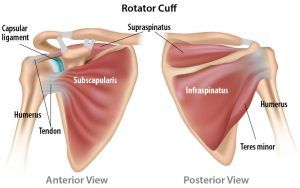
Rotator cuff injuries can be debilitating, causing pain, weakness, and limited shoulder mobility. Traditionally, surgery has been the go-to treatment option. However, recent research has shed light on the effectiveness of exercise as a non-surgical approach to managing rotator cuff injuries. In this blog post, we will explore whether exercise can be as effective as surgery in treating rotator cuff injuries, and the benefits it offers.
Understanding Rotator Cuff Injuries:
The rotator cuff is a group of muscles and tendons that stabilise the shoulder joint. Injuries to the rotator cuff can occur due to trauma, repetitive overhead activities, or degeneration with age. These injuries can range from mild inflammation and tendinopathy to partial or complete tears. Traditionally, surgical intervention has been considered the primary treatment option for severe cases.
Exercise Therapy for Rotator Cuff Injuries:
Exercise therapy, also known as conservative or non-operative treatment, involves targeted exercises and rehabilitation techniques to strengthen the muscles and improve shoulder function. It aims to reduce pain, improve range of motion, and restore functional abilities without the need for surgery.
Effectiveness of Exercise Therapy for Rotator Cuff Injuries
Recent studies have demonstrated promising results regarding the effectiveness of exercise therapy for rotator cuff injuries. Research suggests that exercise therapy can produce comparable outcomes to surgery, especially for patients with partial-thickness tears or non-traumatic injuries. These exercises focus on strengthening the rotator cuff muscles, improving shoulder stability, and addressing any underlying muscle imbalances or postural issues.
Benefits of Exercise Therapy:
- Non-Invasive: Unlike surgery, exercise therapy is a non-invasive approach that eliminates the risks associated with anesthesia and surgery-related complications.
- Cost-Effective: Exercise therapy can be a more cost-effective option compared to surgical interventions, as it avoids the expenses related to surgery, hospital stays, and post-operative care.
- Faster Recovery: Exercise therapy typically involves a shorter recovery period compared to surgery, allowing individuals to return to their daily activities and sports sooner.
- Reduced Risk of Re-Injury: By focusing on strengthening the surrounding muscles and improving shoulder stability, exercise therapy can help reduce the risk of re-injury in the long term.
- Individualised Approach: Exercise therapy can be tailored to each patient’s specific needs, considering factors such as the severity of the injury, functional goals, and overall health condition.
It is important to note that not all rotator cuff injuries are the same, and the treatment approach may vary based on individual circumstances. It is advisable to consult with a qualified healthcare professional, such as a TPM physiotherapist or orthopedic specialist, who can assess your condition and recommend the most suitable treatment plan.
While surgery has long been considered the standard treatment for rotator cuff injuries, exercise therapy has emerged as a viable alternative, particularly for certain types of injuries. With its non-invasive nature, cost-effectiveness, and comparable outcomes, exercise therapy should be considered as a first-line treatment option. However, the decision between surgery and exercise therapy should be made in consultation with a healthcare professional based on the specific characteristics of the injury.
Remember, early intervention and a comprehensive rehabilitation program are crucial for achieving optimal outcomes and returning to a pain-free, active lifestyle.


